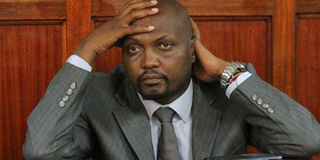Kuria’s Ruto fixing claims open can of worms but Jubilee puts on brave face

Gatundu South MP Moses Kuria at a Nairobi Court on October 6, 2015. The claims of witness coaching made by the MP have opened the Pandora’s Box in the ruling coalition. PHOTO | PAUL WAWERU | NATION MEDIA GROUP
What you need to know:
- The same witnesses, he suggested, may have ended up testifying against Mr Ruto at the International Criminal Court.
- Both sides of the Jubilee coalition are aware that the ICC question is a complex matter that can either build them or destroy them.
- On November 10, 2013, Mr Keter claimed that 10 public officials serving in the Jubilee administration coached witnesses who later appeared before the Waki-led commission of inquiry into the post-election violence.
The claims of witness coaching made by Gatundu South MP Moses Kuria have opened the Pandora’s Box in the ruling coalition, especially because many of the alleged “fixers” remain in government.
In the prayer rallies organised by Jubilee MPs, Mr Kuria claimed that PNU, the party that sponsored President Kibaki for a second term in office, procured witnesses to testify before the Waki and Kriegler commissions that Deputy President William Ruto instigated the post-election violence.
The same witnesses, he suggested, may have ended up testifying against Mr Ruto at the International Criminal Court.
Analysts say Mr Kuria may have opened a can of worms that will do Jubilee more harm than good, especially given that some high ranking members of the ruling coalition were also members of the PNU.
“If his claims that the violence was a political dispute hold water, one only needs to look back at who were in the PNU wing at the time and where the same people are now,” ODM Director of Political Affairs Opiyo Wandayi says.
“It is not rocket science to know that it is a double-edged sword. He (Mr Kuria) was so determined to please his bosses that he went overboard and let the cat out of the bag in the most unexpected manner. Now they are in damage control mode by dragging in Raila’s name.”
A COMPLEX MATTER
Both sides of the Jubilee coalition are aware that the ICC question is a complex matter that can either build them or destroy them.
However, TNA strategists may have considered the options and arrived at the conclusion that the political dividends outweigh any dangers, before they unleashed Mr Kuria.
One of the benefits could have been to silence URP from carrying on with the narrative that its leader, Mr Ruto, has been abandoned at the ICC by TNA.
As such, TNA may claim that even though some of its members were in PNU, the group that fixed Mr Ruto are separate from those currently in government, according to some observers.
Before the 2007 General Election, Mr Uhuru Kenyatta, then the Kanu chairman, gave up his presidential ambitions and supported PNU candidate Mwai Kibaki’s re-election bid.
Since then and until the run-up to the 2013 General Election, he was a close confidante of President Kibaki, who appointed him both the Deputy Prime Minister as well as the Finance minister.
Having supported President Kibaki’s re-election, he became a close confidante of the PNU stalwarts, some of whom Mr Kuria now claims participated in the procurement of witnesses to implicate Mr Ruto as the key perpetrator of the 2007/8 post-election violence.
POLITICAL DISPUTE
This link prompted ODM leader Raila Odinga’s statement on the subject on Tuesday: “The work Kuria did during the course of his employment must be presumed to have been done for and on behalf of his principal, Uhuru Kenyatta.”
Mr Kuria has, however, dismissed claims that he worked for Mr Kenyatta as suggested by Mr Odinga but stated that “this was a political dispute” between PNU and ODM.
“We know who was in Kanu then and we also know who was in PNU,” says Mr Wandayi. “During the life of the grand coalition government, Kanu and PNU were more or less a unit. You cannot divorce the two.”
Leader of Majority in the National Assembly Aden Duale, however, maintains that before drawing conclusions on whether or not the current Jubilee hierarchy has been implicated by Mr Kuria, a historical understanding of the post-election violence is necessary.
“The whole post-election violence was a political contest between ODM and PNU and even the submissions before the Waki and Kriegler commissions were biased because each side was trying to sanitise itself,” he says.
Mr Duale says shifting political alliances changed the dynamics. “When the grand coalition was formed, the players changed.
WITNESSES COACHED
There was a rift in PNU particularly pitting Uhuru Kenyatta and Martha Karua, as the honeymoon between PNU and Kanu disappeared.
“An opportunity to frame Uhuru was, therefore, available. Within the ranks of ODM, the Raila faction was the most powerful and that is why they had the courage to write letters to the UN Security Council.
“In all these battles, the victims were Uhuru and Ruto and that is what Kuria was saying. He is not implicating Uhuru in any way,” says Mr Duale.
That notwithstanding, Mr Duale says, the claims can only be unfavourable to the PNU hierarchy then, “most of whom have either retired like Kibaki and Karua or died such as (Prof George) Saitoti and John Michuki”.
But even as Mr Duale denies that Mr Kuria’s claims could cut both ways in Jubilee, Kericho Senator Charles Keter, who is a confidante of Mr Ruto, had long stated his position.
On November 10, 2013, Mr Keter claimed that 10 public officials serving in the Jubilee administration coached witnesses who later appeared before the Waki-led commission of inquiry into the post-election violence.





